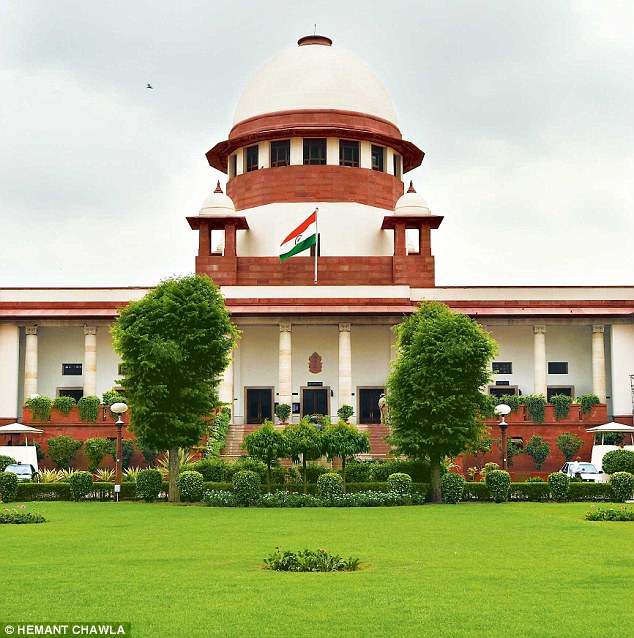![]()
A three-judge bench of the Supreme Court will now determine the validity of the amendments introduced to the Employee Pension Scheme in 2014 by which a cut-off date was fixed for employees to contribute to pension under an enhanced ceiling limit on maximum pensionable salary of ₹15,000 fixed under the Scheme.
On Tuesday, a division bench of Justices UU Lalit and Ajay Rastogi decided to refer the issue in question to a larger bench after the Employees’ Provident Fund Organisation (EPFO) argued that a 2018 judgment of the Supreme Court in RC Gupta case, which had examined this very issue, required reconsideration.
As a division bench could not consider the correctness of another same strength bench’s decision, Justice Lalit, while authoring the reference order, said, “The principal questions that arise for consideration are whether there would be a cut-off date under paragraph 11(3) of the Employees’ Pension Scheme and whether the decision in RC Gupta would be the governing principle on the basis of which all these matters must be disposed of.”
“It would not be appropriate for us to deal with said submissions touching upon the applicability of the principle laid down in the decision in RC Gupta case (that) go to the very root of the matter. The logical course would be to refer all these matters to a Bench of at least three Judges so that appropriate decision can be arrived at,” he added.
The court directed the matter to be placed before the Chief Justice of India for passing appropriate orders.
Both EPFO and central government were before the court in appeal against a judgment passed by the Kerala high court on October 12, 2018 quashing the cut-off date provided under the 2014 amendment to the pension scheme. The HC had relied on RC Gupta case.
The EPFO represented by senior advocate C Aryama Sundaram had said that the liability under the pension scheme and provident fund stood on different footing. He said the six-month window provided from September 1, 2014 had to remain as otherwise it would create great imbalance and amount to cross-subsidisation by those regularly contributing to the pension scheme in favour of those who joined at a later point in time and who then will walk away with all the advantages.
The counsels representing employee associations welcomed the decision of the court to refer the matter to a larger bench but urged the court not to refer reconsideration of the RC Gupta case by the larger bench.
Senior advocate Kapil Sibal, representing the employees, said EPFO in its appeal had not pleaded once that the RC Gupta judgment was wrong. Other senior advocates R Basanth, Meenakshi Arora, Jaideep Gupta and Gopal Shankaranaraynan among others supported this stand claiming that the reference order was being passed without hearing them.
In the RC Gupta case, the SC held that the pension scheme was a beneficial scheme and its purpose should not be defeated by introducing a cut-off date. The Kerala HC, whose order was challenged by EPFO in the present proceedings, relied upon RC Gupta to say, “The proviso to paragraph 11 of the Pension Scheme does not stipulate a cut-off date at all. Any such stipulation of a cut-off date for conferring benefits under the Pension Scheme would have the effect of classifying the employees into persons who have retired before or after the said date.”
Interestingly, the Supreme Court in April 2019 upheld the Kerala HC order and dismissed EPFO appeal. But on a separate appeal by the Centre, a three-judge bench in July 2019 revisited its earlier order and restored the appeals that have been pending for more than two years.
How useful was this post?
- Share review with rating here: Google Review
We are providing practical training (Labor Laws, Payroll, Salary Structure, PF-ESI Challan) and Labor Codes, Payroll Consultant Service & more:
- HR Generalist Practical Training + Certificate: https://oneclik.in/hr-generalist-practical-training/
- Labor Law + Payroll Practical Training + Certificate : https://oneclik.in/labor-law-payroll-practical-training-certificate/ (PF, ESI, Bonus, Payroll & more)
- HR Analytics Practical Training + Certificate: https://oneclik.in/hr-analytics-practical-training-certificate/
- Labor Code, 2020 (Crash Course) + Certificate: https://oneclik.in/labor-code2020-rules-practical-training-certificate-crash-course/
- Advance Excel Practical Training + Certificate: https://oneclik.in/advanced-excel-practical-training-certificate/
- Disciplinary Proceeding & Domestic Enquiry – Practical Training + Certificate: https://oneclik.in/disciplinary-proceeding-domestic-enquiry-short-term-course-with-latest-updates/
- PoSH Act, 2013 ( Sexual Harassment Of Women At Workplace & Vishaka Guidelines) – Practical Training + Certificate: https://oneclik.in/sexual-harassment-of-women-at-workplace-vishaka-guidelines-short-term-course-with-latest-amendments/
- Labour Code (2019 & 2020) With Latest Updates | Labour Bill (Labour-Law-Practical-Training): https://oneclik.in/labour-law-practical-training/ (Factory, Contact Labor, Maternity Act & more)
- PF – ESI Consultant Service: https://oneclik.in/pf-esi-consultant-service/
- Labor Law, Compliance & HR – Payroll Management
Get Latest HR, IR, Labor Law Updates, Case Studies & Regular Updates: (Join us on Social Media)
- Telegram Channel: “One Clik”
- Whatsapp Group: https://wa.me/919033016939
- Facebook: One Clik
- Linkedin: One Clik
- Instagram: oneclik_hr_management
- YouTube: One Clik

